From Derry to Detroit, Éist works to address trauma and healing through art, culture, and media
Éist – pronounced “aysht” – is an Irish Gaelic word that means “to listen.” It is also the name of a Detroit-based organization sponsored by Allied Media Projects that works to cultivate and promote community-based, post-conflict transformative justice through art, culture, and media.
Kate McCabe founded Éist in 2016 and says it was a long time coming. Her passion has long been the struggle for justice and accountability in Northern Ireland in the aftermath of “The Troubles” – a political and ethno-nationalist conflict that primarily took place in Northern Ireland, pitting Ulster loyalists (the mostly Protestant party that controlled the government and police force) against Irish republican nationalists (the mostly Catholic minority party) in a constitutional crisis that would decide Northern Ireland’s future as either remaining a part of the United Kingdom or leaving the UK to join a united Ireland.
The Troubles continued for decades, finally ending with the Good Friday Agreement of 1998 but remaining in the popular consciousness long after, particularly in the lasting imprint of mafia-like glamorized violence perpetrated by the Irish Republican Army (IRA) popularized in mainstream media. The Troubles were a vicious time of guerilla warfare during which over 50,000 people were physically maimed or injured and more than half of the 3,500 killed were non-combatant civilians. Today, Northern Ireland remains part of the UK.
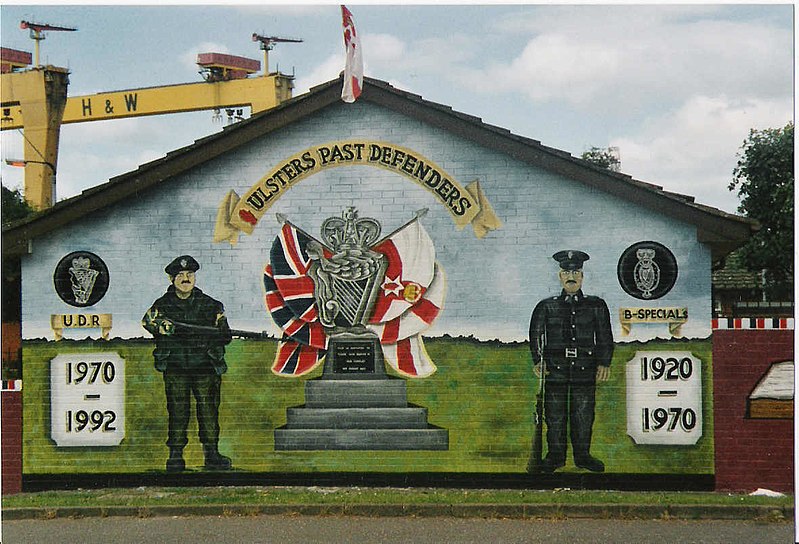
McCabe’s parents both have direct ties to Ireland – her father is from Tullamore in Central Ireland, and her maternal grandfather from Belfast, the capital of Northern Ireland. She conducted her thesis research on community restorative justice in Belfast, and while she was there she forged relationships with victims and survivors. She worked for several years as a lobbyist on issues related to the Irish peace process because the American government played a huge role through the last 20 years of the conflict and the peace process.
She also worked for the International Center for Transitional Justice, one of the only human rights-focused transitional justice organizations in the world, and her experience there, combined with her continued frustration in meeting with politicians who supported peace and justice in Northern Ireland but were not progressive about it, led her to form the nonprofit organization Justice in Belfast.
“I saw a space for things to happen that weren’t happening and saw an opportunity to work with people I wanted to work with to make change happen,” McCabe explains. “In the post-conflict process people focus on institutional change and rebuilding the rule of law, but often the people who bore the brunt of the violence on the ground get left out. Victims and survivors of conflict get put on the backburner.”

Going through the process of forming a 501c3 for the Belfast organization laid the groundwork for Éist. McCabe attended graduate school at the University of Michigan, where she met Allied Media’s Executive Director Jeanette Lee and COO Mike Medow while doing other activism work. When the opportunity came for her to launch a new project with Allied Media as a fiscal sponsor, she took it.
“Going the fiscal sponsor route allows you to do the actual activism work rather than worrying about things like accounting,” she says.
It has now been 20 years since the signing of the peace treaty and the country still struggles with dealing with the legacy of the past and moving forward. At the same time, many people here in America don’t know much about The Troubles in Ireland, with maybe just a Hollywood-informed awareness of the IRA as either guerilla warfare hero/bogeyman.
“I found through my activism work that people might not know about the issue you’re talking about, but when they hear first-hand accounts of a person’s struggles they’re much more inclined to pay attention and become interested in that person’s story and to learn about the experience and the history and background of that experience,” McCabe explains. “I felt that art, culture, and media would be good entry points for people who didn’t know about the issues I’m passionate about.”
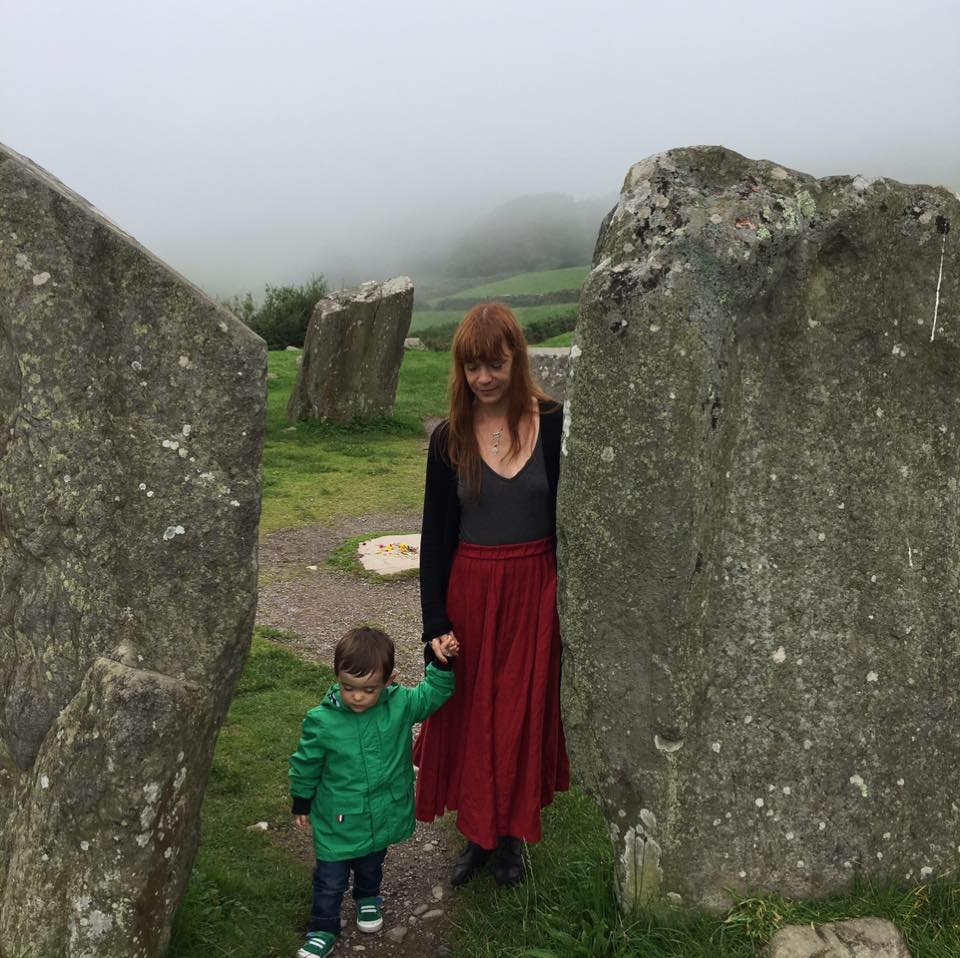
With Éist, McCabe wants to bring together people from different cultural backgrounds and put solidarity at the core of its programming. She has worked with many people – herself included – who had friends and family members killed by the police or the British Army, who are still fighting for truth and justice or just to understand why their loved ones were targeted.
“There are a lot of similarities between the Catholic peoples’ perspectives of the police in Ireland and unarmed people of color killed by police in the United States, but Irish Americans don’t make those connections of solidarity here in the U.S.,” she says. She wants to make those connections as obvious and clear to others as they are to her.
Her first effort under Éist is the Belfast Visionary Fiction program. Inspired by and in collaboration with another Allied Media project, the social justice-meets-science fiction anthology Octavia’s Brood, Éist will hold writing workshops with victims and survivors from both sides of the Northern Ireland conflict, including one specifically for young people.
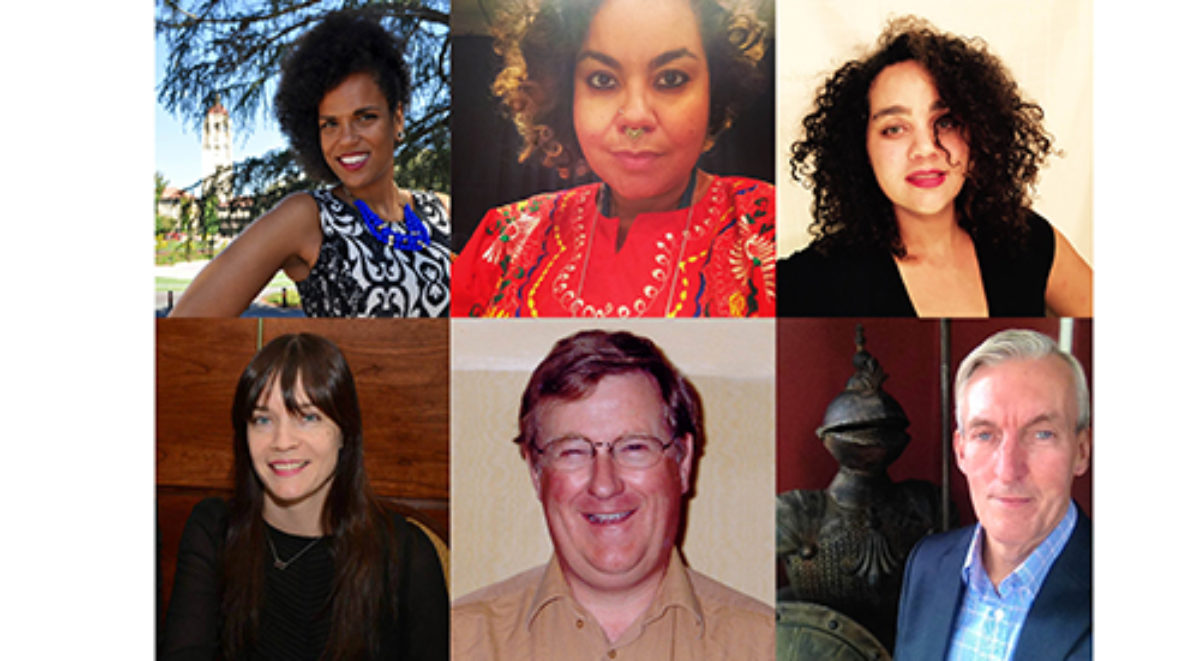
Partnering with the Northern Ireland human rights group Diversity Challenges – led by a Protestant man once involved in the armed services and a former IRA prisoner-turned-playwright – as well as the Irish Writers Centre and Fighting Words youth-focused creative writing workshops, Éist will hold these writing workshops in Belfast to start, working in a community that had a shared experience but from different perspectives, with hopes of also holding them in other parts of Northern Ireland and ultimately producing the first post-conflict visionary fiction anthology.
After that, McCabe would also like to create a transitional justice toolkit for using visionary fiction in post-conflict communities around the world, for people living in places that have not addressed the legacy of the past to have an opportunity to envision their future.
McCabe is also working on an exchange program between the Northern Ireland city of Derry and Detroit called the Derry Detroit Dialogue. Éist has partnered with the Museum of Free Derry and the Hush House Community Museum in Detroit.
This year marks the 50th anniversary of the Northern Ireland Civil Rights Movement, which was inspired by the Civil Rights Movement in the United States and was the precursor to The Troubles that started in 1968.
It began as a fight for housing and voting rights: the people of Derry have similar histories and experiences to people in Detroit in terms of segregation, redlining, and gerrymandering. Derry is also where Bloody Sunday happened in 1972, when the British Army killed 14 unarmed protesters. Initially the story was that members of the IRA had hidden pipe bombs, but only after several tribunals were held they found that they were all innocent victims and no one was armed. Prime Minister David Cameron finally issued an apology and took responsibility for what happened – 40 years later.
McCabe hopes to bring a delegation from Detroit to Derry late this fall when the anniversary is celebrated, and then bring a delegation from Derry to Detroit next spring.
“I want to link up these different communities who have experience of state violence. The solidarity shared between these places could be very powerful,” she says.
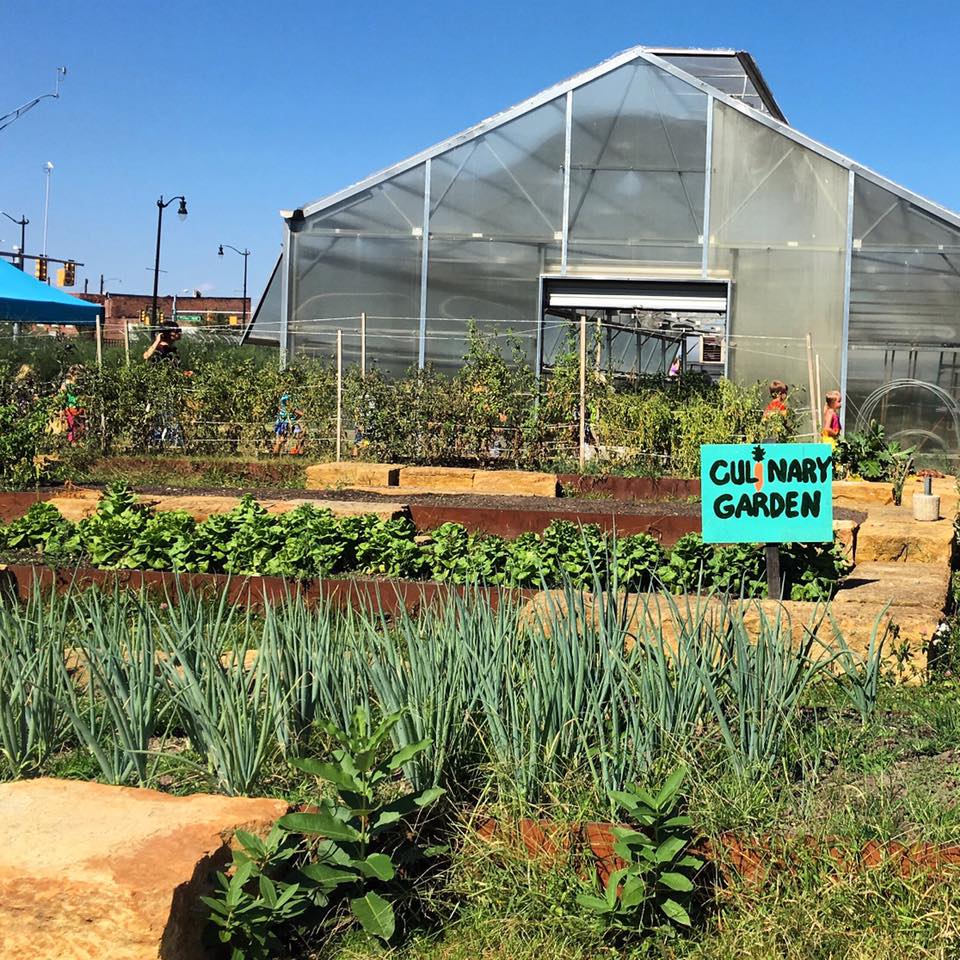
In each city, the exchange will host a series of public events, the creation of community murals depicting the partner city (so, a Detroit-themed mural in Derry and vice versa), and an exhibit on the partner city’s history that will become part of each institution’s permanent collection.
“In this post-conflict process people will become political leaders, such as former paramilitary talking about their experiences and putting down arms, but we see fewer grassroots exchanges,” McCabe explains. “What is great about this Derry-Detroit exchange is that it involves Black Detroiters telling the history of Detroit and civil rights with people from Derry sharing their own history. Also, Detroit has a big Irish American population and it will be interesting to see how Irish Americans in Detroit react to seeing these expressions.”
McCabe says that as a white person she tries to think about ways to talk to other white people about racism and white privilege, and this exchange is intended to do exactly that in a wholly unexpected way.
“While the main goal is for solidarity, there will be people who will learn about solidarity just by coming to the programs we do in Detroit and seeing white people from Ireland talk about having the same experiences as Black people in the United States.”
Additionally, Éist is involved in food justice efforts, which also ties into McCabe’s passion for post-trauma transformative justice. Last year Éist led the food justice track at the Allied Media Conference and will do so again this year under the name FERMENT: Feeding Emergent Resistance Movements, Envisioning Nourishing Traditions.
McCabe says she worked in the restaurant and hospitality industry for many years, and her husband also owns a small catering company and fast casual restaurant in Brooklyn. Her husband is interested in the intersection between food and social justice, and she also studied environmental justice in graduate school, which connects to food justice issues.
“Because our family supports itself in the food industry, we support this food track FERMENT, which is about how food and cooking and eating can be a space where people can come together,” she says.
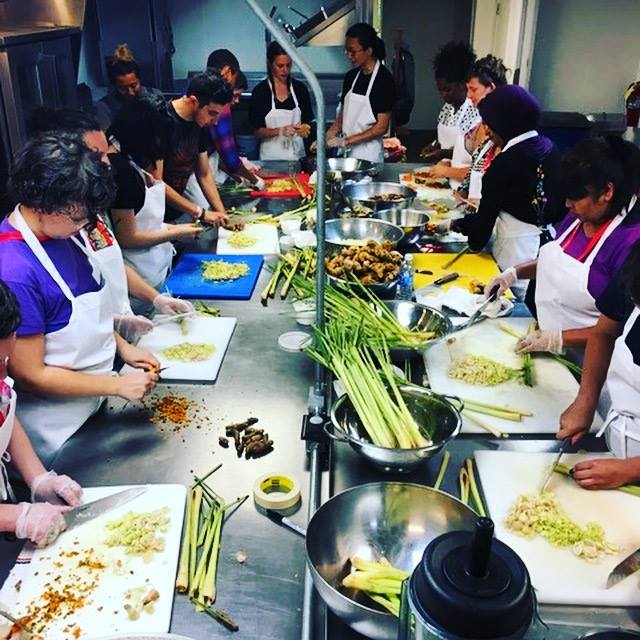
Last year they brought in a Brooklyn-based pop-up called Kreung Cambodia created by chef Chinchakriya Un. Chef Un’s family is refugees form Khmer Rouge and she herself was born in a refugee camp. Her parents never talked about it, though, so she knew little of her family’s experiences during that time. She learned to cook traditional Cambodian food through her mom and aunts, and found that her parents started to open up about their experiences during the war as she learned to cook this traditional food and shared it with them.
At last year’s Allied Media Conference, Un was the centerpiece in discussions of how food can be used to talk about trauma, history, and mass violence.
“At first glance it might seem random for Éist, but this is a really beautiful intersection of dealing with the past and trauma and rebuilding,” McCabe says. “There are lot of intersections between food and resilience.”
The Allied Media Conference will be held June 14-17 in Detroit. Anyone interested in attending can register here.

(1) How do you like to collaborate?
Central to the vision of Éist is the desire to build bridges between grassroots communities around the world dealing with similar issues. Our programs are envisioned and designed as collaborations, and we are lucky to be connected to networks of like-minded individuals and organizations working on justice issues in the US and abroad. Our two major programs connect individuals and organizations from my background working in Northern Ireland with some of my fellow AMP-sponsored projects, such as Octavia’s Brood for Belfast Visionary Fiction, and Petty Propolis for the Derry Detroit Dialogue.
This is the second year we’ve been part of a collective behind the food track programming at the Allied Media Conference; this collaboration was borne in part out of my experience working in the food industry in New York. Last year, we were so fortunate to work with chef Chakriya Un and bring her project, Kreung Cambodia, to Detroit. Kreung uses traditional foods to cultivate community and foster dialogue about intergenerational trauma and healing within families and the broader Cambodian diaspora. Our family owns a small restaurant and catering company called Samesa in Williamsburg, and we are part of a network of chefs and activists working on sustainability and food justice issues in our communities.
(2) How do you a start a project?
Our projects begin with an idea and a dream vision for its success and budget. Our collaborations tend to happen rather organically, as the people we’d like to partner with become rather apparent once the idea has been fleshed out. One of the Network Principles for Allied Media Projects states, “Wherever there is a problem, there are already people acting on the problem in some fashion. Understanding those actions is the starting point for developing effective strategies to resolve the problem, so we focus on the solutions, not the problems.”
Our Belfast visionary fiction project was inspired by the book Octavia’s Brood: Science Fiction Stories from Social Justice Movements, so reaching out to adrienne maree brown to see if Octavia’s Brood might want to be involved in bringing the practice of visionary fiction writing to a particular post-conflict community in Ireland was a no-brainer. Our more recent undertaking, the Derry Detroit Dialogue, while certainly driven by the desire to share the two communities’ civil rights struggles, was also underpinned by a desire to bring victims of state violence from two very different places together to support one another and build solidarity.
(3) How do you talk about your value?
It’s been my experience that most people do not have a lot of background knowledge about the Irish political conflict, so I tend to discuss the value of the work that Éist does by drawing on my knowledge of international justice struggles and connecting our focus and vision to an area of the world that the audience I am addressing is more familiar with. It helps to talk about transitional justice broadly, and to talk about our work as focusing more on transformative justice, which centers and emphasizes the experience and well-being of those most directly impacted by conflict-related violence.
(4) How do you define success?
I think success is about being true to yourself and not measuring progress by other people’s standards. It is early days for an organization like Éist, but we certainly face an uphill battle if only because society tends to turn away from a conflict area once a peace agreement is signed. Many people are unaware of the hard work that goes in to peace building and implementation, and I think if you were to look at the situation in Northern Ireland today, 20 years after the signing of the Good Friday Agreement, you might understand how the hard work actually begins when peace agreements are signed.
(5) How do you fund your work?
So far, in a very, very piecemeal fashion! We have several grant applications pending for our two major programs. Our work is particularly difficult to fund both because it is international in scope and involves a part of the world that many people have forgotten about since it has been 20 years of relative peace.
We are currently involved in or are developing a number of more grassroots fundraising efforts including fundraising dinners (the benefits of being a food industry family!); direct asks; fundraising letters; selling program-related merchandise; and planning a GoFundMe.
